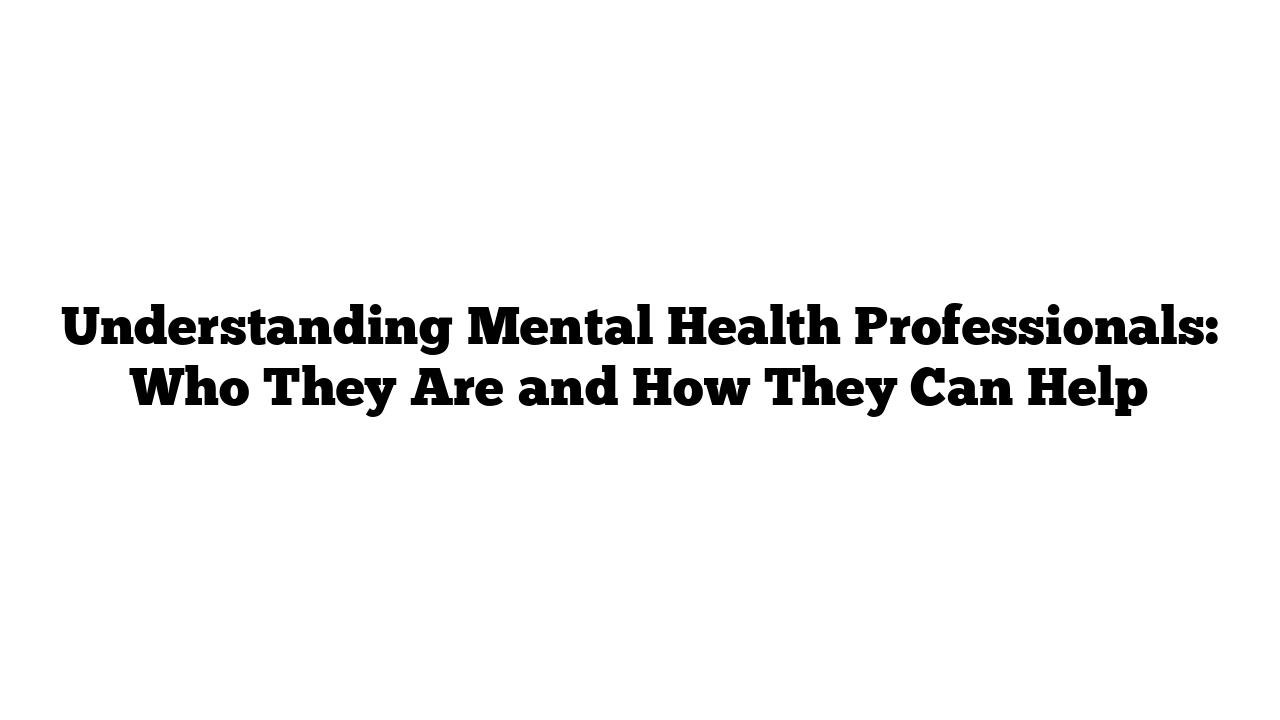Mental Health Professionals : Mental health is just as important as physical health, and seeking help from a mental health professional is one of the best steps you can take when feeling overwhelmed or struggling with emotional challenges. As a doctor, I understand that reaching out to a mental health professional may feel intimidating, but it’s a crucial step toward healing and better well-being. Let’s explore the types of mental health professionals, how they can assist, and how to find the right support for you.
1. What Are Mental Health Professionals?
Mental health professionals are experts trained to diagnose, treat, and support individuals dealing with mental health issues. They provide a wide range of services, from therapy and counseling to prescribing medication, depending on their specialization and your needs.
These professionals play a vital role in helping people improve their emotional, psychological, and social well-being. Whether you’re experiencing stress, anxiety, depression, or other mental health concerns, these experts are here to guide you toward better health.
2. Types of Mental Health Professionals
There are several types of mental health professionals, each offering a different type of support. Here’s a look at the most common ones:
Psychologists
Psychologists are trained to provide therapy and counseling. They use talk therapy techniques to help individuals understand their thoughts, feelings, and behaviors. Psychologists can’t prescribe medication, but they can help people manage stress, anxiety, depression, and other emotional difficulties through therapy.
Psychiatrists
Psychiatrists are medical doctors specializing in mental health. They can diagnose and treat mental health conditions and are able to prescribe medications. If you have a mental health disorder that may require medication (such as anxiety, depression, or schizophrenia), a psychiatrist may be the right choice.
Licensed Professional Counselors (LPCs)
LPCs are trained in providing counseling services and helping individuals cope with various emotional challenges. They often focus on talk therapy and are skilled at working with people of all ages. They may specialize in different areas, including grief, trauma, or family issues.
Social Workers (LCSWs)
Licensed Clinical Social Workers (LCSWs) are mental health professionals who provide therapy and counseling services. They are trained to work with individuals facing mental health struggles, but they can also help with family dynamics, social issues, and community support.
Marriage and Family Therapists (MFTs)
MFTs specialize in helping families and couples navigate challenges. They work with individuals, couples, and families to improve communication, resolve conflicts, and address mental health concerns within family dynamics.
3. How Mental Health Professionals Can Help
Mental health professionals provide a variety of services aimed at improving mental and emotional well-being. Here’s how they can assist:
- Talk Therapy: Talking about your thoughts and feelings with a professional can help you gain clarity, insight, and understanding.
- Coping Strategies: These professionals teach practical skills for managing stress, anxiety, and other mental health concerns.
- Medication Management: For some, medication is a necessary part of treatment. Psychiatrists can help find the right medication and monitor its effects.
- Crisis Intervention: In times of extreme emotional distress, mental health professionals provide support to help you navigate a crisis and prevent harm.
4. When Should You See a Mental Health Professional?
It can be difficult to know when it’s time to seek help, but there are several signs that indicate it’s a good idea to consult with a mental health professional:
- Persistent feelings of sadness or hopelessness.
- Inability to cope with daily responsibilities or overwhelming stress.
- Changes in sleep or appetite that affect daily life.
- Unexplained mood swings or irritability.
- Difficulty concentrating or making decisions.
If you experience any of these symptoms, it may be time to reach out for help.
5. Finding the Right Mental Health Professional
Finding the right mental health professional for you depends on your needs. If you live in the USA, there are many online platforms and directories that can connect you to licensed therapists, counselors, and psychiatrists.
Look for professionals with the right credentials, experience, and areas of expertise. If you’re unsure, consider reaching out for a consultation to see if their style and approach match your needs.
For more advice on finding and working with a mental health professional, visit medicaltimes.io.
Top 10 FAQs About Mental Health Professionals
- What’s the difference between a psychologist and a psychiatrist? A psychologist provides therapy and counseling, while a psychiatrist is a medical doctor who can prescribe medications.
- How do I know if I need therapy? If you’re feeling overwhelmed, anxious, or unable to cope with everyday life, therapy can help. Mental health professionals can guide you through challenges and provide coping tools.
- Are mental health professionals covered by insurance? In many cases, yes! Many insurance plans in the USA cover mental health services. Check with your insurance provider for details.
- Can a mental health professional help with relationship issues? Yes! Marriage and family therapists specialize in helping couples and families navigate conflicts and improve communication.
- What should I expect during my first therapy session? Your first session typically involves discussing your history, current challenges, and what you hope to achieve through therapy.
- How do I find a mental health professional near me? You can search online directories, ask for referrals from your doctor, or use online platforms that connect you with licensed professionals in your area.
- Do I need a referral to see a mental health professional? In most cases, you don’t need a referral, but it’s best to check with your insurance provider.
- How long does therapy usually last? Therapy duration depends on your individual needs. Some people may need only a few sessions, while others may benefit from longer-term therapy.
- Can mental health professionals prescribe medication? Psychiatrists and certain other medical professionals can prescribe medication. Psychologists and counselors cannot.
- What should I do if I can’t afford therapy? Look for sliding-scale therapists, or check if your insurance covers mental health services. Many communities also offer low-cost mental health resources.
